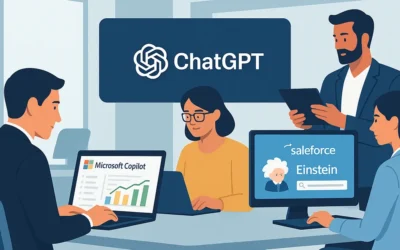Artificial Intelligence is no longer a luxury for large enterprises. In 2025, small and medium businesses are using affordable AI tools to streamline operations, write content, manage customers, and even control smart hardware. The barrier to entry has vanished — and the ROI is real.
Part 1: Best AI Software Tools for Small Businesses
Let’s begin with the SaaS side — the AI platforms that power marketing, analytics, and workflow automation without needing an in-house data team. These are real-world tools that startups and SMBs use every day.
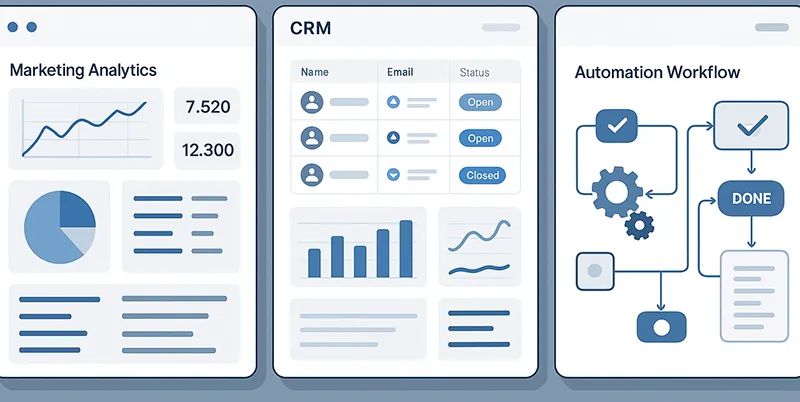
1. ChatGPT & Microsoft Copilot — Everyday Productivity
OpenAI’s ChatGPT (especially the GPT-5 edition) and Microsoft Copilot are now embedded in Outlook, Teams, and Excel. They help teams summarize meetings, generate drafts, analyze sales data, and automate emails. For businesses using AI in IT operations, these assistants close the gap between people and data.
2. Notion AI — Content, Notes & Planning
For startups that live inside Notion, its AI feature drafts documents, creates task summaries, and improves clarity. It’s perfect for founders juggling multiple projects without hiring a content team.
3. Jasper & Writesonic — Marketing Copy in Minutes
These tools specialize in AI marketing copy. Entrepreneurs use them to produce product descriptions, blog intros, and social media captions in seconds. Jasper’s tone-adjustment feature ensures the content feels human, aligning with brand identity.
4. Grammarly Business — Communication that Scales
AI grammar isn’t just for emails anymore. Grammarly’s Business plan adds clarity scores, tone detection, and style guides. It ensures every customer reply and proposal maintains a professional tone across teams.
5. Zapier AI & Make.com — Automate Workflows
Zapier now uses AI triggers that decide when to act. For instance, it can summarize feedback from Google Forms and send highlights to Slack only when patterns emerge. Automation no longer needs rigid rules — the AI interprets intent.
6. HubSpot AI — Sales, Marketing, and CRM
HubSpot’s 2025 update includes predictive lead scoring, auto-generated deal notes, and chatbots powered by GPT models. For small sales teams, this means more deals closed with less manual logging.
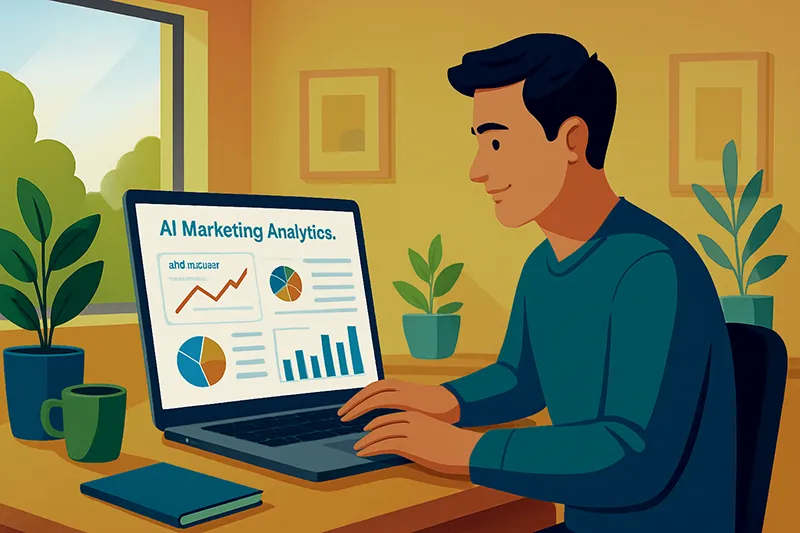
7. QuickBooks AI & Zoho Books
AI accounting is transforming finance. QuickBooks now detects anomalies in expenses and predicts cash flow trends. Zoho Books’ Smart Scan automates receipt categorization — no manual data entry required.
8. Google Workspace Duet AI
Duet AI brings real-time writing and data analysis into Docs and Sheets. It summarizes long spreadsheets, creates visuals, and formats reports instantly — ideal for founders managing investor decks.
Part 2: Best AI Hardware & Automation Tools
Hardware-driven AI is quietly changing how small shops, offices, and restaurants operate. From voice assistants to smart cameras and IoT sensors, the line between software and device is fading fast.
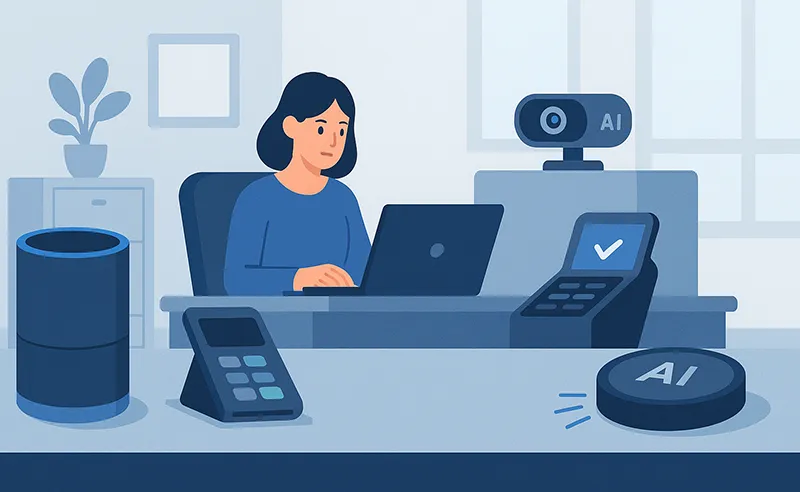
1. Square POS with AI Insights
Square’s latest POS system includes AI-based sales forecasting and inventory suggestions. For cafés or retail shops, it recommends restock timing and predicts peak sales periods.
2. Amazon Alexa for Business
Alexa’s business suite integrates meeting scheduling, voice-controlled device management, and customer interaction scripts. When connected with Microsoft 365, it can announce appointments or retrieve order statuses hands-free.
3. Ubiquiti UniFi Protect + AI Cameras
AI-driven surveillance helps business owners detect unusual movement patterns or crowding. It pairs beautifully with Zero Trust Security principles by ensuring only authorized access.
4. Logitech Sight & Rally Bar
These AI-enabled conference devices automatically focus on the active speaker, improving hybrid meetings. Ideal for SMBs using Microsoft Teams or Zoom for client sessions.
5. Eufy Security Smart Locks
Small offices can deploy biometric locks that sync with mobile apps and access schedules. AI analytics log entries and detect anomalies — a simple but strong layer of physical security.
6. Smart Energy Systems (Sense & EcoFlow)
These AI energy monitors learn usage patterns, cutting power waste. Restaurants and warehouses use them to track peak loads and reduce bills — sustainability with measurable ROI.
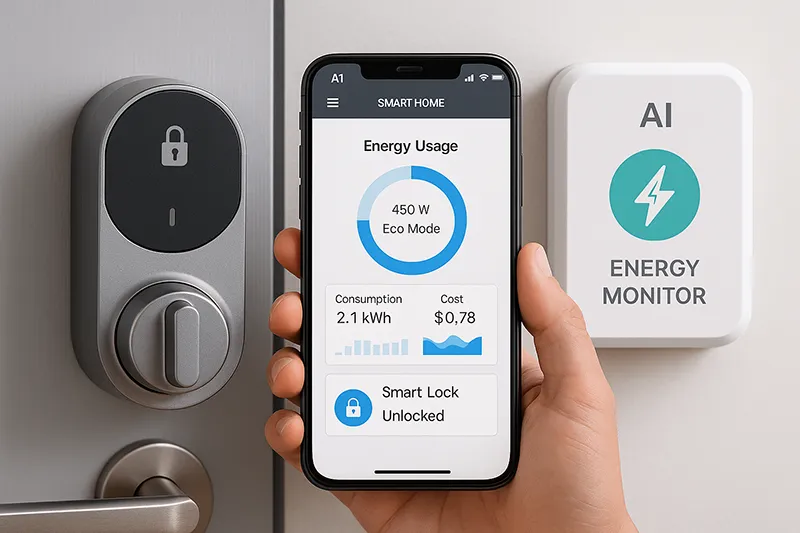
How to Choose the Right AI Tools
Start with pain points, not features. Identify the tasks that slow you down — invoicing, content creation, scheduling, or customer tracking. Then choose one tool that automates that specific area. Build gradually instead of adopting ten tools at once.
Also consider compliance and privacy. Tools handling customer data should follow encryption and MFA standards similar to what’s discussed in our cybersecurity lessons guide.
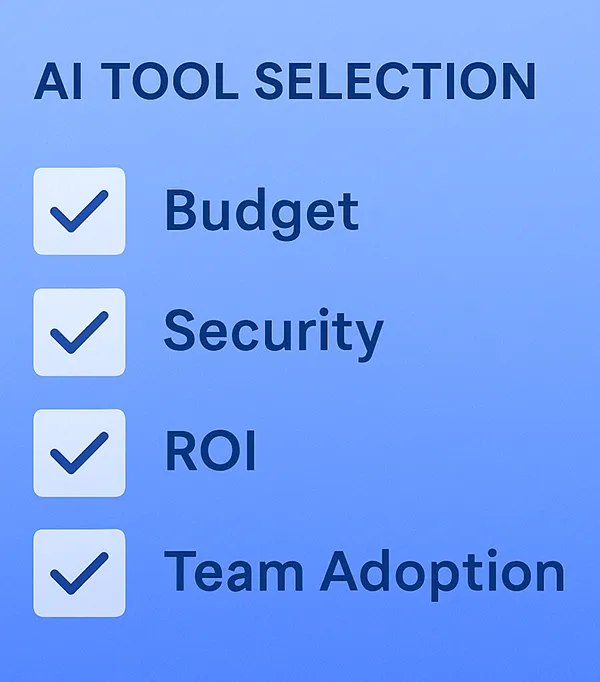
Business Impact: Why AI Matters in 2025
AI adoption among SMBs grew 45% in the past year. The top measurable gains include faster response times, lower operational costs, and smarter marketing. More importantly, it reduces burnout by automating busywork.
Frequently Asked Questions
What AI tool gives the best ROI for small businesses?
AI accounting and workflow automation tools like QuickBooks AI or Zapier deliver the fastest measurable ROI because they directly save time and reduce manual errors.
Do I need technical skills to use AI tools?
No — most 2025 AI platforms use no-code interfaces. If you can use Google Docs or Slack, you can automate workflows with AI triggers and templates.
Are AI tools secure for customer data?
Reputable vendors apply encryption and zero-trust frameworks. Always enable MFA and review access logs, as outlined in our Zero Trust Security guide.
How much should a small business budget for AI?
Start small — most tools offer free tiers. Expect to spend $50–$150 per month once you integrate multiple systems (CRM, accounting, marketing).




